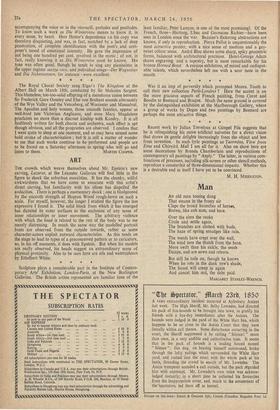brilliantly supplies."—New Statesman. 12s. 6d. net.
FICTION
THE EDGE OF DOOM
By LEO BRAD Y
Winner of the Annual Golden Book Award of the Catholic Writers' Guild.
• " An impressive outing to the Graham Greene country."—Evening Standard.
RECOMMENDED BY THE BOO K SOCIETY 9s. 6d. net.
A CORNER 0 F THE WORLD
By ROBE RT SHAPLEN Dramatic and beautifully dra n studies of personality and conflict in the Far East. 10s. 6d. net. / / / / / /
/
/ /
1938, from the reserve habitually maintaind even between the U.S.S.R. and the.Czechs whom Goebbels incessantly damned as her agents.
The disparate quality of Europe in Decay—appropriate to its title—raises the question of whether a book review should be an essay independent of a particular publication.. If it should not, then a collection of reviews is unlikely to make a wholly satisfactory collection of essays. ELIZABETH WISKEMANN.
The Story of France
A History of France. By Andre Maurois. Translated from the FrenMt by Henry L. Binsse.. (Cape. 25s.) , " FRANCE'S history," writes M. Maurois, " a standing miracle, seems more dramatic than that of other countries." It is in the spirit of telling a dramatic story, rather than of cautious scientific analysis, that M. Maurois has tackled his fascinating task ; and the result is, as it has already been hailed' in France, the best modern one-volume history of France. The implicit decision to make political history the core was, despite the example of M. Seignobos, inevitable ; for it is the political history of France which is the most dramatic and most obviously continuous. But the author has skilfully contrived to graft on to the political narrative as much social and cultural history as can be smoothly integrated with the political story. With economic history he is less happy, and, although he tries intermittently to include this important aspect, there is too often an impression of its being tagged on as a desperate afterthought. Yet with more care and thought surely the results of the work of. Daniel Gudrin, Georges Duveau, Edouard Dolleans and others might have been more fully and beneficially incorporated into the familiar political narrative of modern French development. On cultural history and its connection with national evolution M. Maurois is naturally at his very best ; and the chapters on " How, during the Middle Ages, French civilisation took shape," on " How, during the eighteenth century, the Phflosophes became a political force," and on " How France thought and felt between 1815 and 1848 " are masterpieces of condensed assessment and brilliant apercus.






























































 Previous page
Previous page